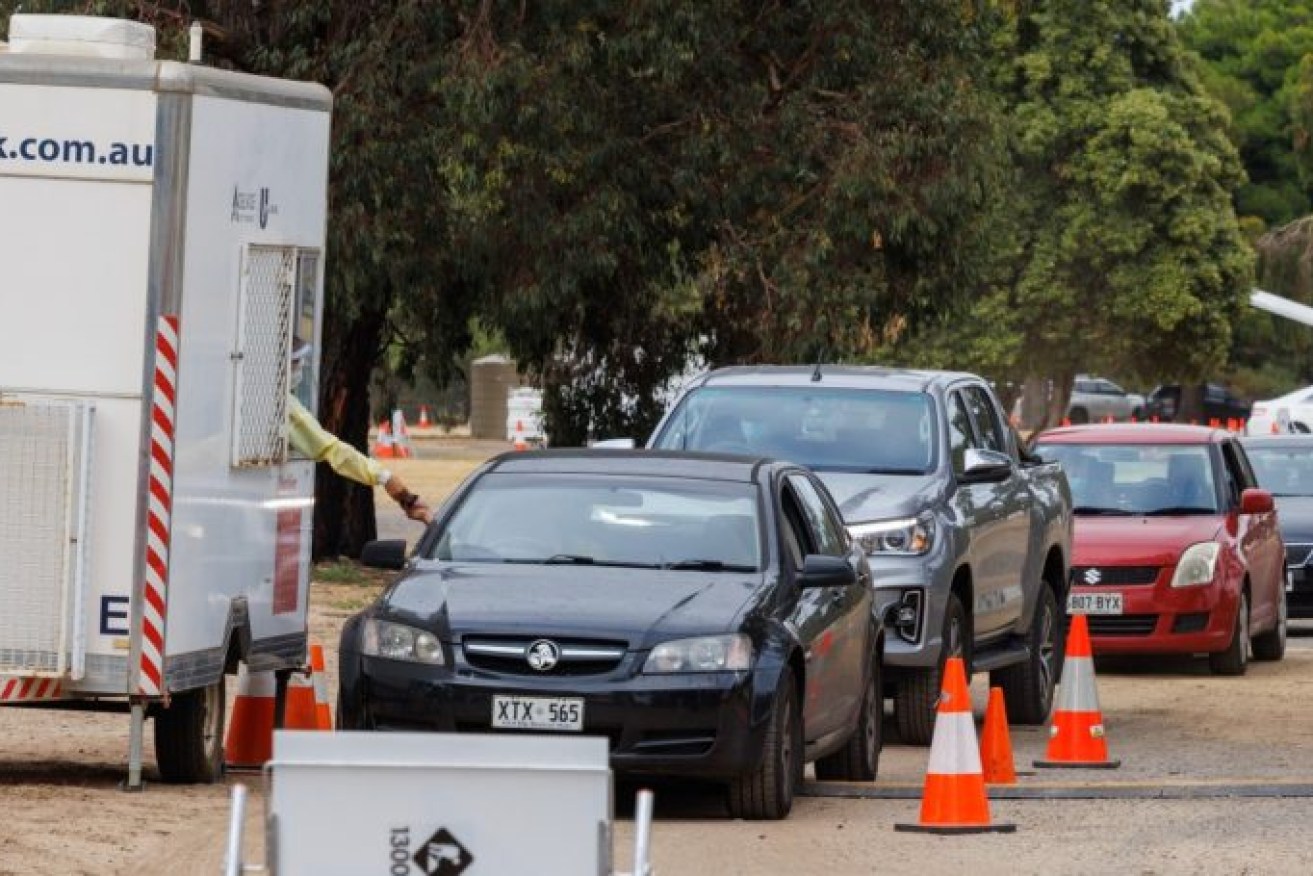‘We’re at crisis point’: COVID-hit Salisbury calls for support
UPDATED | South Australia’s most COVID-hit local government area has called on the State Government to establish a rapid test collection point, as the northern suburbs grapple with a disproportionate share of the state’s pandemic cases.


The rapid antigen test pick up site in the south park lands is too far away for northern suburbs residents, according to Salisbury Mayor Gillian Aldridge. Photo: Tony Lewis/InDaily
As the State Government sets up free rapid antigen test collection sites across the state for close contacts, the City of Salisbury last night unanimously passed a motion expressing the council’s “concern and disappointment” that a RAT pick up centre is yet to be established in its area.
“The City of Salisbury has made available to the State Government facilities to be utilised for RAT collection and calls on the Premier to immediately establish a RAT collection point in the City of Salisbury,” the motion states, citing “inadequate” public transport provisions for locals and lower vaccination rates in the region.
Premier Steven Marshall responded to the plea this afternoon, assuring northern suburbs residents that RAT collection points would be made available in their area “before the end of the month”.
“The police commissioner (Grant Stevens) has got plans to roll out more,” Marshall told reporters.
“I know that there were queries regarding sites out north, I can actually confirm that we will be having additional sites.
“I think we are in final negotiations with both Playford and Salisbury to set up sites there, certainly before the end of the month.”
The State Government on Monday announced the dates for when six new RAT collection sites will open this week but did not provide specifics on when a Salisbury hub would be established, stating they would be “opening soon”.
The council’s frustration comes as Salisbury deals with the highest COVID-19 caseload in South Australia, with SA Health data reporting 8350 active cases in the area and 8406 confirmed positive cases.
The adjacent LGAs of Port Adelaide/Enfield (6438 active cases) and Playford (4793 active cases) are the next highest.
Both Playford and Salisbury were short of the 80 per cent vaccination mark when South Australia reopened its borders on November 23, with Salisbury only reaching 72 per cent coverage for over-15s on November 21 while Playford was at just 65.4 per cent – well below the statewide average which was nearing 80 per cent.
Vaccination rates in the two populous areas have increased significantly since, with Salisbury reaching 88.3 per cent on Sunday and Playford passing 86 per cent.
But Salisbury Mayor Gillian Aldridge said her community is now “begging” for a RAT collection point to deal with the soaring caseload.
“The fact is we have a community of 150,000 people, a high percentage of those are born overseas [and] a lot of them are new to Australia,” she told InDaily.
“Now we’re having crises throughout our communities.
“A lot of community leaders have come to us and said, ‘we have COVID in our community and we really are lost – we don’t know what to do’.
“We need a rapid testing bay of some kind right in the centre of Salisbury … I think it would reduce the numbers of people who are lining up for hours and often have got the virus and feel incredibly sick.”
Asked whether the council had put forward any specific sites to the State Government, Aldridge said: “We have put forward many sites.”
She said the provision of rapid tests would help those with large families that live in the same home.
She also said it was difficult for residents to travel to the other RAT collection points in the state due to ongoing closure of the Gawler train line which services Salisbury and Playford.
“A lot of people can’t get in a car, can’t afford a taxi, so we need something where it’s convenient,” she said.
“It actually takes you over an hour to catch a bus, so you can imagine people just don’t, especially on a hot day.
“People are scared, they’re scared to go anywhere, they’re scared to do anything.
“We’re at crisis point in Salisbury and we need help.”
Playford Mayor Glenn Docherty said his council has been working with the State Government to prepare a suitable location for a collection site.
“Distributing the kits to everyone who needs them is vitally important for good public health outcomes and I encourage the government to announce the location and commence operation of the collection site as soon as possible,” he said.
The State Government is expecting the delivery of 256,000 rapid tests every day until January 26, boosted by a further shipment of 3.6 million RATs in early February.
New RAT collection points opened in Port Augusta and Murray Bridge today, with sites in Mount Gambier and Port Adelaide/Enfield due to come online on Thursday and in Charles Sturt and Naracoorte on Saturday.
Meanwhile, South Australian paramedic and Ambulance Employees Association industrial officer Josh Karpowicz said the ambulance service has seen a “disproportionate” increase in callouts to the northern suburbs since the borders opened.
“The northern suburbs has always been one of the busiest areas for the ambulance service,” he said.
“But since the COVID outbreak, we’ve had a disproportionate increase in calls from the northern suburbs for various issues, some of them being severe complications from COVID as well.”
However, the region’s improved vaccination rates have helped to ease the initial spike in callouts to the area, according to Karpowicz.
“When borders first opened, the northern suburbs was lagging behind in vaccination rates – that did actually increase our callouts to acute and severe COVID complications,” he said.
“We are still seeing those calls, but as vaccinations rise we are seeing less and less of them, which is good to see.”




